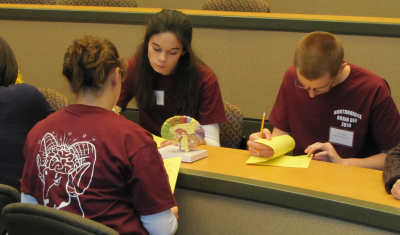|
|
Quick, what’s the name of the seahorse-shaped structure that’s key to learning, memory and emotion?
A. hypothalamus
B. hippocampus
C. thalamus
If you didn’t say B, the hippocampus, you should have come to the Fifth Annual Central Massachusetts Regional Brain Bee on Saturday, Feb. 12, to brush up on neuro-anatomy and learn a thing or two about your brain. As in prior years, Amphitheatre II was buzzing with close to 100 teens showing off their knowledge of the human brain.
Hosted by the Brudnick Neuropsychiatric Research Institute (BNRI), a division of the Department of Psychiatry, the Central Massachusetts Brain Bee is part of the school’s ongoing outreach mission to educate teens in Worcester and the surrounding communities. It is one of more than 30 regional competitions that lead up to the annual National Brain Bee, a program of the Society for Neuroscience and the Dana Foundation designed to educate teens about neuroscience and to encourage them to consider a career in a scientific field.
“The Brain Bee is a great way for us to get high school students to think about careers in neuroscience and psychiatry,” said Douglas M. Ziedonis, MD, MPH, chair and professor of psychiatry. “It’s also very impressive, even for those of us who’ve been in the field for a long time, to see how much these kids know about the brain.”
Nearly 100 area teens in grades nine through 12 from a dozen area high schools registered for this year’s Brain Bee, which began with a written exam of questions such as “What is the approximate number of taste buds on the human tongue?” and “How many watts of power does the human brain consume while awake?” that hit upon structure, function, development and disorders. After the written test, the 10 students with the highest scores entered an oral question-and-answer competition. Contestants were knocked out after three incorrect answers, leading to a final round of questions that left only one student standing: Raashika Goyal, a junior from the Advanced Math and Science Academy Charter School in Marlborough.
Goyal was a formidable competitor whose knowledge of the brain was enhanced last summer, when she was a 2010 summer intern in the UMMS Department of Psychiatry. Under the supervision of Jean King, PhD, professor of psychiatry at the Center for Comparative Neuroimaging, she examined models for Parkinson’s disease, observed behavioral tests and learned about MRI scans. She also spent a day with neurosurgeon Julie G. Pilitsis, MD, PhD, assistant professor of surgery, and hopes to herself become a neurosurgeon some day. She currently has her sights set on attending an accelerated medical program or a prestigious undergraduate program in the sciences.
Goyal now holds the regional title and received the Andrew M. Sheridan Young Neuroscientist Award, named for a Central Massachusetts native who passed away during his sophomore year at Hamilton College in New York, where he hoped to major in neuroscience. Goyal will also travel to the National Brain Bee in Baltimore in March—during Brain Awareness Week—to compete against winners of the other regional Bees held across the country. The trip is funded by the Department of Psychiatry, which also co-sponsors the Central Massachusetts Brain Bee with BNRI and the Dana Foundation, a private philanthropic organization that supports brain research through grants and educates the public about the successes and potential of brain research.
